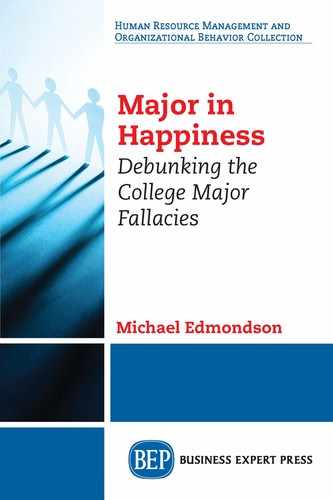The price of success is hard work, dedication to the job at hand, and the determination that whether we win or lose, we have applied the best of ourselves to the task at hand.
—Vince Lombardi
Introduction
While part one of this publication outlined the situation regarding college majors and the second section explained the mental traps that people fall into, this third and final section provides a variety of assessments to help students increase their self-awareness. What do self-assessments have to do with the college experience, the selection of a college major, professional development or launching a career? There are many reasons. First, self-assessments are valuable tools students can leverage in order to achieve the self-awareness required to sustain the personal growth and professional development in today’s hyper-competitive global marketplace. Since “76% of organizations with more than 100 employees rely on assessment tools such as aptitude and personality tests for external hiring” students need to realize that their days of testing will most likely continue after graduation.1
Moreover, as New York Times columnist Frank Bruni pointed out in Where You Go Is Not Who You'll Be: An Antidote to the College Admissions Mania: “the level of work and effort applied by a student, the self-examination that is undertaken, and the resourcefulness that is honed all matter more than the name of the institution attended.”2 And I would add those all matter more than the major declared as well. Thus, all students, regardless of their institution, major, or grade point average, need to make self-examination a priority. Doing so is critical to launching a career in today’s hype-competitive global marketplace. Engaging in periodic self-assessments is also vital for a healthy and productive career over the course of decades.
Recognizing that many employers are unhappy or disengaged from their work, one observer noted “It's no wonder many of us aren't fully satisfied with where we're at professionally. We keep ignoring that crucial personal component that helps drive great results.”3 In short, personal growth is directly related to professional development. If you want to advance in your career as a professional you will need to dedicate yourself to personal growth. To develop that crucial personal component, and to succeed in the job market of today and tomorrow, workers across all industries and titles will need to engage in a great deal of self-reflection. Doing so will allow people to get better at the necessary skills of human interaction. As Geoff Colvin noted in Humans Are Underrated: What High Achievers Know that Brilliant Machines Never Will, workers need to “become champions at the skills of human interaction-empathy above all, social sensitivity, collaboration, storytelling, solving problems together, and building relationships.”4 Completing self-reflection exercises on a regular basis will help you increase the self-awareness required to improve upon one or more of those skills Colvin mentioned.
These assessments are relevant for undergraduates across all majors and regardless of the next step after graduation. Even if you want to attend graduate school medical school, law school or some other program, self-assessments should be a priority. Each assessment helps students better understand one specific objective they can accomplish in order to prepare for life after graduation. As the previous section illustrated, having just a college degree is far from sufficient if you want to launch and sustain a career over multiple decades. One needs a commitment to lifelong learning, a significant level of self-awareness, an open mind, and a high level of energy to move forward amidst the chaos of today’s global marketplace. As one of the largest professional services firms in the world PricewaterhouseCoopers (PwC) stated in a February 2015 white paper Data Driven: What Students Need to Succeed in A Rapidly Changing Business World: “self-awareness involves being clear on personal values, understanding your strengths and weaknesses, and being cognizant of one’s impact on others.”5
The assessments included in this section can help you identify your personal values, understand your strengths and weaknesses, and provide insight into your impact on others. As stated earlier, you are ultimately responsible for your career so leverage personal assessments to increase your self-awareness and achieve the personal growth and professional development required to succeed in today’s hyper-competitive and ever changing global marketplace. Each of the assessments included in this section are designed to increase your level of self-awareness. Complete these assessments now and every few months revisit your answers. Doing so allows you to compare your answers as you periodically complete each assessment. The following assessments are in no particular order:
• Build Your Bridge
• Career Target
• AIM for Your Purpose
• The Greater Fool
• The Milkshake
• The Openness and Awareness Index
• Career Vision
• Soft Skills
• “How Good Do You Want to Be?”
• Professional Skills
• Personal Assessment of Traits and Habits to Success
• Emotional Intelligence
• Social Media
• Communicate Your Value

